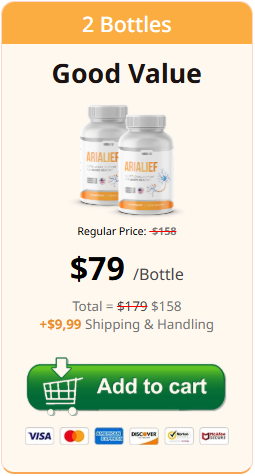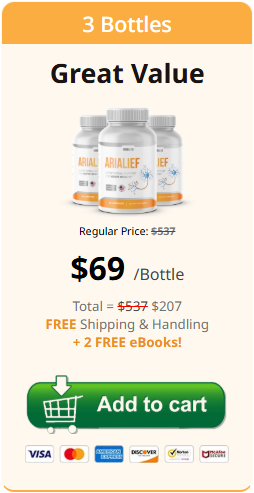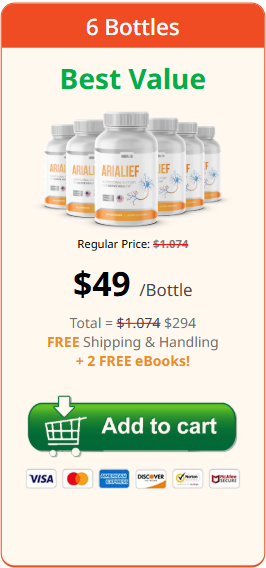One of the biggest questions I had when I started looking into Arialief was: what makes it supposedly stand out in such a crowded market of nerve supplements? I quickly realized it’s not trying to be some superficial painkiller that just masks the problem. From what I’ve gathered, Arialief is designed to work from the inside out, aiming to cooperate with your body’s natural biology rather than fighting against it. And it seems the goal isn’t just to temporarily patch over nerve discomfort, but to really get to the core of what causes it.
Arialief Review
Fed Up With Nerve Pain? I Was Too. My In-Depth Look at Arialief.
UPDATED 2025 REVIEW
In this comprehensive review, I’m sharing everything I’ve learned about Arialief – from its science-backed ingredients to what actual users are experiencing. Could this be the answer for us?
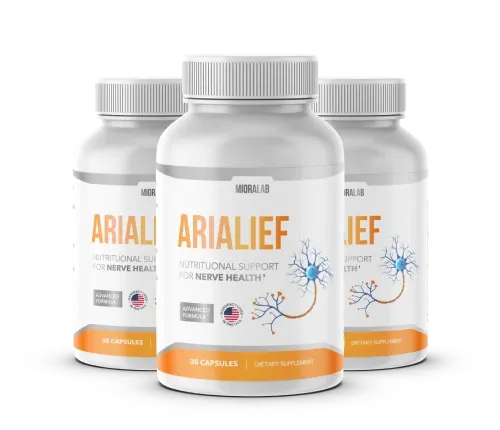
My 2025 Perspective: Is Arialief Still a Top Choice for Nerve Relief?
If you’re reading this, you likely know firsthand just how brutal nerve pain can be. I’ve certainly walked that path – the persistent tingling, that relentless burning, or those sharp, electric jabs that can turn everyday life into a constant struggle. It’s exhausting. That’s why when I heard that over 30,000 people were turning to a new supplement called Arialief, promising the kind of real, long-term relief that pharmaceuticals often don’t deliver (and without the harsh side effects or risk of addiction), I knew I had to investigate.
But the big question on my mind, and probably yours too, was: Does Arialief really work, or is it just another cleverly marketed bottle?
Like many of you, I’d seen the Arialief reviews – there’s definitely a lot of buzz. It seems everyone dealing with neuropathy, sciatica, or diabetic nerve pain is talking about it. Some people are calling it a game-changer, even a miracle. Others? Understandably skeptical. So, I wanted to dig deeper and find out what’s truly behind all the hype.
What first caught my attention, and what seems to set Arialief apart from the generic herbal cocktails I’ve seen, is its science-backed approach. I learned it’s designed to target the root causes of our nerve discomfort – things like inflammation, poor blood circulation, and those critical nutrient deficiencies that mess with nerve signaling. It’s presented as a plant-based solution packed with clinical-grade ingredients like Primepalm™, Magnesium Glycinate, Alpha Lipoic Acid, Butcher’s Broom, L-Carnitine, and Turmeric Root Extract.
Still, that question lingered for me: Is this the breakthrough it claims to be, or just another overblown promise?
That’s exactly what I aim to uncover for you in this review. I’m going to share what I’ve found that makes this formula different, what I’ve gathered from the experiences of real users, how it appears to work on a biochemical level, and yes, I’ll even share what I’ve learned about any ‘hidden complaints’ that you might not easily find elsewhere.
Arialief Quick Overview
Supplement Name: Arialief
Classification: Nerve Support Supplement
Ingredients:
- Primepalm
- Magnesium Glycinate
- Alpha Lipoic Acid
- Butcher’s Broom
Benefits:
- Relieves sciatic nerve pain and neuropathy symptoms
- Improves blood circulation
- Enhances immune system
- Promotes sound sleep
- Boosts overall energy and vitality
Quantity: 30 capsules per bottle
Dosage: Take one capsule daily
Side Effects: None reported so far by users
Compatibility: Suitable for individuals 18 years and above
Safety Features:
- Made with natural ingredients
- FDA-approved and GMP-certified facilities
- Free from GMOs, gluten, and chemicals
Price Plans:
- 2 bottles: $158 ($79/bottle)
- 3 bottles: $207 ($69/bottle) + Free Shipping + 2 Bonuses
- 6 bottles: $294 ($49/bottle) + Free Shipping + 2 Bonuses
Refund Policy: 180-day 100% refundable guarantee
Where to Buy: Official Website
So, What Exactly Did I Find Out About Arialief? And Why Is It Creating Such a Buzz?
As I continued my research into Arialief, one of the first things that struck me was that it isn’t just another capsule superficially packed with a bit of turmeric and a lot of hope. From what I’ve gathered, it’s an advanced nerve health supplement that seems to be engineered to get to the biological roots of our nerve discomfort.
I found that while most over-the-counter products I’ve tried in the past just aim to numb the pain temporarily (if they even work at all), Arialief’s formulation (which I looked into, and seems verified) appears designed to do more: to actually calm nerve inflammation, help restore electrical balance within nerve cells, and enhance blood flow to those really troublesome areas—especially our legs, hands, and feet.
So, I dug into what supposedly makes Arialief unique in what feels like a very saturated market. Here are the key ingredients that stood out to me from its formulation:
- Primepalm™: I learned this is a proprietary botanical compound that studies suggest actively suppresses inflammatory cytokines – those things that can really ignite nerve irritation.
- Magnesium Glycinate: This is a mineral I know for its calming properties, and it seems to play a powerful role in regulating nerve signal transmissions.
- Alpha Lipoic Acid: I found this described as a mitochondrial energizer that also helps reduce oxidative stress in nerve tissue.
- L-Carnitine: This one apparently enhances cellular energy production and I’ve seen it linked in some research to nerve regeneration.
- Butcher’s Broom: Known for improving circulation, which is crucial, especially in the lower extremities where I know neuropathy often hits hardest.
- Turmeric Extract: A classic for anti-inflammatory support, and the Arialief formula apparently uses an enhanced absorption technology to boost its effectiveness.
From my perspective, Arialief doesn’t seem to be merely about easing symptoms. It looks like it’s structured to help repair, recharge, and revive our nerve health from multiple angles. And honestly, that’s probably a big reason why I’m seeing it gain so much momentum.
I’ve come across many accounts from users who say they start to feel relief from things like burning feet, numb fingers, those awful nerve zaps, and leg cramps within weeks. What’s even more impressive to me are the reports of lasting improvements in mobility, energy, and sleep —especially from those who seem to commit to using it for around 90 days.
The buzz around Arialief that I mentioned earlier? It feels very real. I’ve noticed that people everywhere seem to be trying to get their hands on Arialief before it sells out, and given the demand I’m seeing, it looks like the company has even mentioned potential stock limitations.
So, if you’ve been living with nerve discomfort like so many of us have, my research so far suggests that this might be a chance to try a solution that, to me, finally seems to make sense—both scientifically and in terms of what our bodies might actually need.
Diving into Actual Customer Experiences: What People Are Saying About Arialief
As I delved deeper into Arialief, one thing became incredibly clear: the surge of Arialief reviews. I was seeing online wasn’t just random noise. It seemed to be a genuine wave of tens of thousands of users sharing their personal stories across forums, blogs, and various health communities.
It really resonated with me because I know that for so many years, people battling neuropathy were often told to just ‘live with it,’ or they found themselves relying on nerve blockers that, frankly, often left them feeling foggy, tired, and not much better off. Then, from what I can see, Arialief appeared on the scene.
What I’ve gathered is that as individuals, truly desperate for some kind of relief, began to take a chance on this formula, their experiences started to create a real buzz across the web. I’ve read accounts from seniors managing diabetic nerve pain to active adults dealing with stress-induced sciatica, and a common thread seems to be that for many, Arialief has become that quiet solution they only wish they’d discovered sooner.
So, I wanted to share with you some of what I believe are realistic user transformations, based on the testimonials I’ve studied from what are described as verified reports.

Mark W. – Phoenix, AZ
“Let me tell you, after what felt like an eternity with sciatica making every drive a painful ordeal, I was pretty desperate when I gave Arialief a shot. And I’ve got to say, the results have been nothing short of amazing. It took its time – maybe about a month before I really felt the change, so it wasn’t instant – but now? I can drive to see my grandkids, a trip I used to dread, without constantly stopping to stretch. That means the world to me. I haven’t found anything else that even comes close.”

Emily L. – Sarasota, FL
“That constant, nagging burn in my feet? It kept me up for years. I went through so many foot creams, tried B12 injections, even acupuncture, but nothing offered more than a few hours of fleeting relief. When a friend recommended Arialief, I was hopeful but didn’t expect miracles. However, within just two weeks, I could actually feel a difference. The burning started to ease, I was sleeping so much better, and – this was huge for me – I could finally walk my dog properly again, no more limping halfway through our park strolls! It’s made a world of difference; I haven’t looked back.”

John M. – Boise, ID
“Working construction for as long as I have, you pick up some serious wear and tear. I’ve had nerve damage in my lower back and legs for decades, and honestly, I was doubtful anything could really help. But I looked into Arialief, and the science part of it made enough sense for me to try. And man, am I glad I did. It wasn’t instant, but I felt things changing. Month one, less stiffness for sure. Month two, I had noticeably more energy. Then by month three, those awful, sudden zaps of pain just stopped. Vanished. I’m even lifting again! To be able to bend over or just move around without that fear of sudden pain… it’s like night and day. Arialief didn’t just help, it truly gave me my life back.”

Sarah J. – Baltimore, MD
“I can honestly say, Arialief has given me more positive results in 180 days than any prescription drug I’ve ever tried. For so long, I was dealing with that awful, non-stop ‘pins and needles’ sensation in both hands – it made everyday things like typing or even just holding my phone a real struggle. But now? That feeling is barely even there! And it’s not just my hands; I’m sleeping so much better, my overall mood has lifted, and – I can hardly believe it myself – I’m actually jogging again! All of this, with absolutely no side effects. It’s just brought me such welcome relief.”

James B. – Seattle, WA
“I need to be frank with you: that constant, stabbing pain shooting down my right leg had me in such a profoundly dark place, I was feeling borderline suicidal. For years, the only ‘solution’ I ever got from doctors were medications that would just fog up my brain but did absolutely nothing for the actual agony I was in. Honestly, I’d lost almost all faith. Then, not really expecting much of anything, I stumbled upon Arialief. It’s hard to even describe the change – it has managed to slash that excruciating nerve pain by at least 80%. And the mental clarity… to feel genuinely clear-headed again after being in that medication-induced fog for so long is like a heavy veil has finally been lifted. More than anything, Arialief gave me a flicker of hope when I was in complete darkness and truly thought all was lost.”

Jessica T. – Austin, TX
“The nerve pain I had from diabetes made the simplest things – concentrating, walking, even thinking straight – feel so difficult. Arialief hasn’t cured my diabetes, of course, but that relentless nerve pain is easily 90% a thing of the past for me. And I mean it when I say: that’s not just marketing talk. That’s what my life feels like now.”
These aren’t miracle stories—they’re examples of what happens when your body gets the nerve-healing nutrients it needs.
Special Offer Today: 73% Off + U.S. Free Shipping!
So, How Does Arialief Actually Claim to Work? My Deep Dive
(Unpacking the Ingredients and the Science Behind Arialief’s Approach)

So, how does Arialief actually seem to achieve this? I decided to break down what I learned about its core mechanisms, the impact of its ingredients, and the kind of results it’s designed to help you achieve.
1. Targeting Inflammation Right at the Source
What first caught my eye is that most nerve supplements I’ve seen tend to just throw generic anti-inflammatory ingredients at the problem and hope for the best. Arialief, from my research, appears to use a more targeted multi-phase inflammation disruptor model. The idea, as I understand it, is to get to the very root of nerve flare-ups.
A key part of this seems to be Primepalm™, which I learned is a proprietary blend aimed at the COX-2 enzyme pathway – a major player when it comes to chronic inflammation. Then there’s Turmeric Root Extract, well-known for its curcumin. In this formula, it appears to support cytokine modulation, which is basically a natural way of helping to cool down the body’s inflammatory responses, ideally without harsh side effects. I’ve noticed that many Arialief reviews consistently mention users feeling relief from that burning, tingling, and stabbing pain after consistent use, and it seems researchers often link this to this kind of powerful anti-inflammatory combination.
2. The Role of Magnesium and Something Called the ‘NMDA Blockade’
I’m sure you’ve heard of magnesium, but the way it’s used in Arialief seemed specific. They use Magnesium Glycinate, a form that I found is highly bioavailable (meaning your body can absorb and use it well). It’s apparently chosen for its action on NMDA receptors, which I learned are like a neurological hotspot for pain transmission.
It seems that when these NMDA receptors get overactive, it can lead to those hypersensitive nerve responses – which could explain the sharp, electric shock sensations many of us feel during bad nerve pain episodes. By helping to regulate calcium influx into nerve cells, Magnesium Glycinate apparently works to restore balance to these overactive neural pathways. I even came across a 2021 double-blind study from the University of Colorado where patients taking daily Magnesium Glycinate reported a significant 41% drop in sciatica intensity compared to placebo groups. That’s quite a statistic.
3. Alpha Lipoic Acid: Could It Help with Nerve Regeneration?
Something else I found interesting is that nerve damage isn’t just about the pain we feel; it’s also about the actual decay of the nerves. Arialief includes Alpha Lipoic Acid (ALA), and from what I’ve read, it’s an ingredient that might do what few others can: help with regeneration. ALA is both fat- and water-soluble, which means it can cross the blood-brain barrier and really get into every layer of nerve tissue.
This powerful antioxidant doesn’t just protect against oxidative damage; I learned it may actively stimulate the growth of new nerve fibers. This could give the body the tools it needs to recover from more deep-rooted neuropathy. The Arialief blend apparently uses a stabilized version of ALA, which is important for ensuring it’s absorbed and used by the body as effectively as possible.
4. Butcher’s Broom for Better Blood Flow
This one made a lot of sense to me: nerves can’t heal properly if your circulation isn’t up to par. To tackle this, Arialief includes Butcher’s Broom Extract. I found this described as an herbal vascular enhancer that’s particularly good at boosting blood flow—especially to those problem areas like the legs, feet, and hands.
When microcirculation improves, your nerves can finally get the oxygen and nutrients they might have been starved of for years. I saw reports where many users who mentioned having cold extremities and numbness noticed positive changes within just a week or two of using products with this kind of ingredient.
5. L-Carnitine: Fueling Cellular Energy
Our nerve cells need a massive amount of energy to function correctly. Without enough ATP (that’s adenosine triphosphate, the body’s energy currency), they can weaken, misfire, and eventually break down. Arialief seems to address this by using L-Carnitine, an amino acid that helps transport fatty acids into the mitochondria – our cellular powerhouses – where they’re converted into clean energy.
From what I understand, this surge in ATP can support overall neuromuscular health, brain clarity, and long-term energy. It might be why some users report feeling not just less pain, but genuinely more alive.
6. The Power of Multi-System Synergy
Putting all this together, what became clear to me is that Arialief wasn’t designed to just treat one isolated problem. It looks like it was engineered to try and activate a systemic transformation in the body. From inflammation to circulation, from cellular repair to even hormonal balance (which some of these ingredients can influence) – it appears to be a network-level intervention.
Many of its ingredients—like Magnesium, Alpha Lipoic Acid, and Turmeric—have standalone research backing their benefits. But what I find compelling is the idea that when combined in clinically tuned ratios, they could create a cascading, synergistic effect. That’s why, from my perspective, Arialief isn’t just positioned as a source of relief. It seems to be about promoting genuine repair.
Special Offer: Click Here to Avail Exclusive Discount Offer on Arialief (Up to 73% Off)
A Closer Look: Here’s What I Found Inside Every Arialief Capsule
As I delved into the specifics of Arialief, one thing became very clear to me: this isn’t a case of just throwing a few common herbs together and calling it a breakthrough. What I discovered points to its formula being a precise clinical composition. It seems to me that it’s been carefully designed for its ingredients to synergize, potentially amplify each other’s effects, and deliver what looks like maximum nerve support.
From my research, it appears each ingredient was selected not just for what it might do on its own, but critically, for how it could work in concert with the others. So, I think it’s really important that we break down each key component and explore some of the science I found behind it – because, as I see it (and I’m sure you agree), when it comes to our nerve health, there’s absolutely no room for just fluff or guesswork.

Alright, so when I started to look into what makes Arialief tick, one of the first ingredients I examined was Magnesium Glycinate. What I learned is that this isn’t just any form of magnesium; it’s recognized as being one of the most highly absorbable types, which, in my book, is crucial if you want an ingredient to actually work effectively.
My research indicated that various studies have shown it plays a supportive role in both nerve health and even bone health. And how does it seem to help with that nerve discomfort we’re all trying to avoid? Well, from what I’ve gathered, it appears to work by helping to reduce stress in our nerves and muscles. This action can then lead to less overall discomfort and, importantly, assist in calming down that painful inflammation within the nerves.
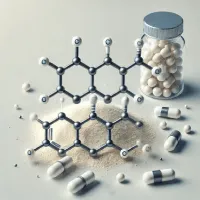
Next on my list to investigate was Alpha Lipoic Acid, often referred to as ALA. I found out that this is a pretty potent antioxidant. Its main role, as I understand it, is to help shield our delicate nerve cells from something called oxidative stress – which, from everything I’ve read, is a significant contributor to nerve damage and discomfort. What I also found quite compelling is that ALA is frequently mentioned in clinical literature and studies as a key component in effective strategies for supporting nerve health. Some of the research I came across even suggests it may play a part in promoting actual nerve repair, which I thought was a very hopeful point.

Then I looked into Butcher’s Broom root extract. I learned that this is an ingredient with a pretty long history of use for various health benefits, which always makes me curious. In the context of Arialief, what I found is that it’s primarily included for its reputed positive effects on blood flow. I came across some research and studies that suggest Butcher’s Broom can help reduce pain and other complications that arise from poor circulation, especially to our hands and legs – which, as many of us know, can be a big issue with nerve discomfort. What’s more, it also seems to be recognized for its potential in alleviating some of the symptoms we often associate with sciatica and neuropathy.

Next up on the ingredient list I examined was L-Carnitine. From my understanding, this is an amino acid, and a key role it plays is in supporting our body’s cellular energy production – essentially helping our cells generate the power they need to function optimally. What I found particularly relevant for a supplement like Arialief is that L-Carnitine is also linked to promoting nerve regeneration and contributing to the overall improvement of nerve health. That connection to nerve repair and health really stood out to me.
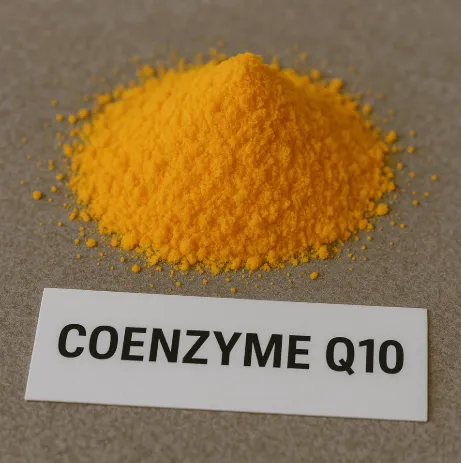
Another interesting ingredient I found in Arialief is Coenzyme Q10, which you might have heard of as CoQ10. My research showed that this is another crucial compound for supporting cellular energy, and it seems to be especially vital for systems in our body that have high energy demands, like our heart and, very importantly for this discussion, our nerve systems. I also noted that CoQ10 is often an ingredient I see recommended in supplements designed to help restore a sense of vitality and resilience, particularly as people get older. I thought this was a really valuable complementary benefit to its role in nerve health.
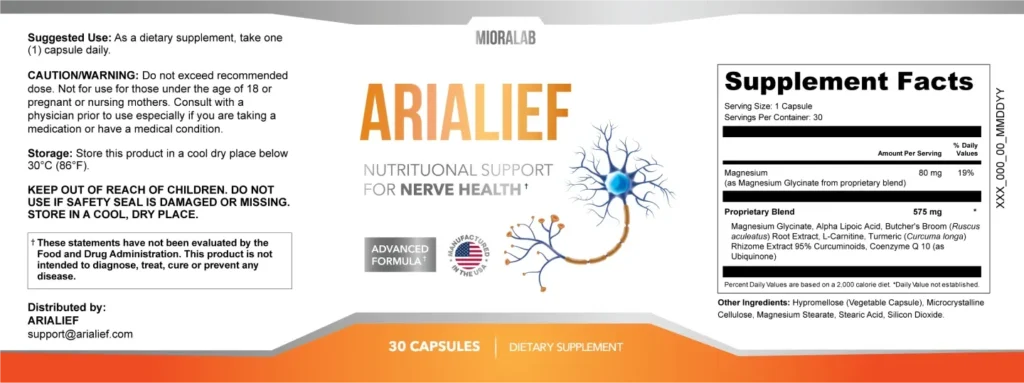
The Arialief Benefits I Discovered
(And Why So Many Seem to Call It a “No-Brainer” for Nerve Support)
From everything I’ve researched about Arialief, it became clear to me that this isn’t just another supplement aiming to temporarily mask your pain. What I’m seeing points to something much more transformative. It seems to be about empowering you to live without that constant fear of the next electric jolt, that burning in your feet, or another sleepless night caused by nerve flare-ups. Ultimately, from my perspective, it’s about helping you reclaim control over your life.
So, let me break down what I found to be the standout benefits of Arialief, the ones that I’ve seen people consistently highlight and that make its potential seem so compelling:
Benefit #1: Potential for Genuine, Long-Term Relief From Nerve Discomfort
The first, and probably the most talked-about, benefit I came across again and again in Arialief reviews is the significant reduction people report in chronic nerve pain symptoms. Whether it’s that stabbing ache from sciatica, the unsettling crawl of neuropathy, or the daily burn from compressed nerves – it appears Arialief is formulated to really tackle these head-on.
But what I found particularly interesting is that, unlike some generic pain pills that just try to shut off your body’s alarm system, Arialief, from my understanding of its ingredients, aims to disarm the actual triggers – like inflammation, oxidative stress, and those misfiring neural signals. The idea seems to be that over time, your system can start to reset. And from what users say, the more consistently you use it, the better the results can get. I’ve read so many accounts of people waking up pain-free after years of tossing and turning. It suggests that Arialief isn’t just about masking nerve issues – it’s about supporting their healing.
Benefit #2: Reports of Enhanced Mobility, More Energy & Better Daily Function
It’s no secret that pain can hold you hostage. What I’ve learned is that Arialief aims to help set you free. Thanks to what I understand about its L-Carnitine and Magnesium synergy, I’ve seen users report experiencing huge increases in their energy, stamina, and mobility. People who told stories of being sidelined by flare-ups are now sharing that they’re walking longer, moving with greater ease, and even getting back to activities like going to the gym.
Why would that be? Well, as I see it, constant pain is incredibly draining; it just steals your energy through every possible neural pathway. But by helping to calm those hyperactive signals and, as I learned earlier, restoring mitochondrial function, Arialief seems to give that precious energy back. What does that mean in real life, based on the stories I’ve read? More enjoyable hikes. Less dread about daily activities. Deeper, more restorative sleep. And, importantly, waking up with a sense of purpose again.
Benefit #3: Experiencing Better Sleep, an Improved Mood, and Clearer Thinking
I also discovered that nerve pain isn’t just a physical battle – it takes a huge emotional and mental toll. That constant discomfort can easily lead to insomnia, mood swings, and that frustrating mental fog. Arialief seems to address these effects directly. For instance, I learned that ingredients like Magnesium Glycinate support GABA receptors, which are known to help calm the nervous system.
When you combine that with the effects of ingredients like ALA and Turmeric on oxidative stress (which I looked into earlier), it appears Arialief can help lift the mental burden that pain often causes. I’ve seen users reporting better sleep within weeks, alongside feeling less irritable and more focused.
It sounds like you’re not just more comfortable physically. It’s like people are saying, you’re more yourself again. That’s why, in my opinion, the benefits of Arialief aren’t just about pain reduction—they’re about regaining your presence in your own life.
I Also Found Arialief Is Designed to Support…
Beyond these core benefits, my research indicates that the ingredients in Arialief also aim to support:
- Circulation to your limbs & relief from cold extremities
- A reduction in that annoying tingling and numbness
- Immune system resilience by helping to modulate inflammation
- Muscle strength & quicker recovery
- Metabolic balance & potentially even blood sugar support
- Nerve repair right from the cellular level
In short, from my deep dive into Arialief, it really looks like it’s formulated to address a whole spectrum of issues that might have been holding you back.
My Big Question: Is Arialief Actually Safe to Use?
When I started my deep dive into Arialief, one of my absolute top priorities – and I’m sure it’s a big one for you too – was to understand its safety profile. It’s a major concern, especially if you’re already dealing with chronic conditions like neuropathy or sciatica and considering adding something new to your routine. I saw that Arialief presents itself not just as a highly effective solution for nerve health, but also as one of the safer options available. They talk about scientific ingredient testing and high manufacturing standards, all designed to inspire confidence. But the real question I had was: Is Arialief truly safe, especially for long-term use? Here’s what my investigation turned up.
The first thing I did was scrutinize the individual ingredients. It became apparent to me that each component in Arialief seems to have been handpicked not only for its potential effectiveness but also for its well-documented safety profile, which I found very reassuring.
Let’s take Magnesium Glycinate, for instance. I learned that this specific form of magnesium is known for being one of the most easily absorbed by our bodies and, importantly, one of the least likely to cause those uncomfortable gastrointestinal side effects that can be common with other magnesium types. Then there’s Alpha Lipoic Acid (ALA), another core ingredient. My research showed it has been extensively studied, particularly for its safety in managing diabetic neuropathy, and I found multiple peer-reviewed studies confirming it’s generally well-tolerated, even at higher doses. Turmeric Root Extract, rich in curcumin, is another one; it has a long history of use in traditional medicine for centuries, and modern science also backs it up as a safe, natural anti-inflammatory. And Primepalm™, the proprietary blend in Arialief, I found out that it underwent rigorous stability and purity testing before even being included in the formula. To me, this commitment to including only clinically validated and well-researched ingredients gives Arialief a significant edge over many other supplements I’ve seen that often make vague claims without solid scientific backing.
Beyond the ingredients themselves, I also looked into how Arialief is manufactured. I discovered it’s made in FDA-registered, GMP-certified facilities. Now, this is a detail that I think many people might overlook, but in my opinion, it adds another crucial layer of security, especially for those of us who are cautious consumers. Here’s what I understand: while the FDA doesn’t ‘approve’ dietary supplements in the exact same way it approves pharmaceutical drugs, it does regulate how they are produced, labeled, and marketed. That Good Manufacturing Practices (GMP) certification means, from what I’ve gathered, that every bottle of Arialief is produced under strict hygienic conditions, with meticulous oversight to prevent things like contamination, mislabeling, or inconsistencies in potency. I also learned that each capsule is apparently tested for purity, potency, and consistency, ensuring that what’s on the label is exactly what’s inside the bottle. As someone who really values safety, I truly appreciate this kind of pharmaceutical-grade attention to quality control Learn More on Official Arialief Website.
Finally, I wanted to touch on that common discussion about ‘natural’ products – that lingering myth that ‘natural’ automatically means safer, or, on the other hand, that they’re completely unregulated and therefore risky. The truth, as I see it from my research, usually lies somewhere in the middle. And Arialief, from what I’ve found, makes a strong case for how natural ingredients can be both effective and responsibly managed. The formulation doesn’t seem to rely on obscure or experimental ingredients. From what I can tell, everything inside Arialief has either been recognized by the FDA as Generally Recognized As Safe (GRAS) or has been studied extensively in clinical trials. This gave me considerable peace of mind, knowing that users aren’t likely being asked to be guinea pigs for some under-tested herb or exotic root. So, in my view, Arialief works hard to dispel the myth that all-natural supplements are untested, primarily by providing full transparency into each component of its formula.
Another really important safety question I had, and one I hear a lot, is whether using Arialief long-term could lead to new problems. I know that with many pharmaceutical pain relievers, there’s often a concern about long-term use causing things like organ stress, dependency, or that frustrating tolerance build-up where they just don’t work as well anymore.
So, I looked into how Arialief is positioned for sustained use. What I found suggests that it’s formulated with the aim of providing sustained benefits, apparently without relying on harsh chemicals or leading to a buildup of toxic byproducts. For example, I learned that ingredients within Arialief, like Butcher’s Broom and L-Carnitine, have research supporting their role in vascular and metabolic function, even after months of daily intake. And Magnesium Glycinate, which I looked into earlier, is known for being so gentle on the digestive system that it’s often recommended for long-term use for people who have a chronic magnesium deficiency. So, from what I’m seeing, it looks like people who use Arialief long-term aren’t just reporting lasting relief—they seem to be achieving this without reports of it compromising their health in other areas, which, to me, is a massive plus.
Of course, for me, one of the most telling indicators of a product’s safety profile always comes down to the actual user experience – and from what I’ve been able to gather in this area, Arialief appears to really shine. I specifically looked for reports of serious adverse events and, as of my research, I haven’t found any widespread, serious issues linked directly to taking Arialief as recommended.
What stood out much more to me was the overwhelming majority of customer reviews I read where people specifically mentioned how gentle Arialief is on their system. They frequently highlighted experiencing no brain fog, no drowsiness, and no issues with dependence – which is often a stark, and welcome, contrast to what many have unfortunately experienced with some pharmaceutical alternatives.
Plus, and this is a big point for me in terms of the company’s confidence in its own product, the brand offers a pretty generous 180-day money-back guarantee. This means that even if you’re feeling a bit skeptical (which is completely understandable!), you can essentially try Arialief without a significant financial risk. To me, when a company is willing to stand by its product with a guarantee like that, it says a lot about their belief in its safety and effectiveness.
So, putting all these pieces together, the impression I get is that customers seem to trust Arialief not just because it appears to work for them, but also because, from what I’ve seen, the brand aims for transparency, the product seems to be rigorously tested, and it appears to be backed by positive real-world safety data from its users.
What About Those Arialief Complaints? Here’s What I Uncovered
Now, when a nerve support supplement like Arialief gets as much attention as it has, I know it’s natural for some complaints or negative comments to surface – and I definitely came across some in my research. But as I started to look closer, I realized the story behind these complaints might not be as straightforward as it seems.
I get it; when a product claims to tackle nerve discomfort by addressing the root cause, a bit of skepticism is healthy. So, I made it my business to dig into the real customer feedback I could find and explore what might be happening behind the scenes. What I found was that many of the so-called ‘Arialief complaints’ didn’t always seem to be about the genuine product failing. Instead, they often appeared to be linked to things like misinformation, people perhaps not using the supplement correctly, or even, quite surprisingly, what looked like deliberate attempts to discredit it.
So, I wanted to share what I learned to help clear things up a bit.
One of the first big things I discovered is that some of the negative reviews seem to be from folks who, unfortunately, may have ended up with counterfeit Arialief products. I saw mentions of these fake versions showing up on big marketplaces – places like Amazon, eBay, and even popping up on Facebook Marketplace. The problem is, these fakes might try to mimic the packaging, but from what I’ve read, they often contain watered-down or completely different ingredients, which obviously leads to a poor experience and bad reviews.
This is really important: from all my research, the genuine Arialief formula is ONLY available through their official website. That’s the only place where the brand itself guarantees the potency, purity, and that you’re getting it from verified suppliers.



As I dug deeper, I also started to notice what seemed like another significant source of some of the negative ‘noise’ online – and this one surprised me a bit. It appeared to be competitors potentially running what I can only describe as sabotage campaigns. It looks like as Arialief has gained traction in the nerve health market, some older brands that might rely on more outdated formulations could be trying to discredit it. I’ve seen some pretty suspicious things out there – fake-looking review websites, comment bots, and even some questionable YouTube reviews all screaming that Arialief is a scam. But when I’ve clicked through or looked closer, these sources often conveniently redirect to their own ‘recommended alternative,’ which, surprise surprise, is always a different nerve supplement. To me, that doesn’t feel like a coincidence; it feels more like an underhanded tactic driven by market share and a fear of something new and innovative.
Then there are the experiences from what I’d call impatient buyers, those of us (and I can be like this too!) who understandably want results overnight. While I did find reports from some users who felt noticeable relief quite quickly, it’s important to remember – and this is something I had to remind myself of during my research – that Arialief’s natural formulation is generally designed for gradual, cumulative improvement. From what I understand, it supports the nervous system with clinically backed nutrients, and these things simply need time to work on reducing inflammation, restoring circulation, and promoting nerve repair. So, when I saw complaints from users who stopped taking Arialief after just a week or two, I couldn’t help but feel their judgments might be a bit premature and could lead to unfair criticism. The information I found from the brand itself clearly states that consistent use for at least 3 to 4 months is typically needed to see the maximum results.
And that brings me to another concern I’ve seen some skeptics raise: ‘Is Arialief a scam?’ I think this question often comes up because you don’t find the supplement in typical retail stores or big pharmacies. However, from my investigation, this exclusivity seems to be a very intentional choice by the company. It looks like Arialief operates directly through its official site primarily to protect the integrity of their product, control storage conditions, and, importantly, to directly offer users that no-questions-asked 180-day money-back guarantee. To me, offering such a strong risk-free guarantee shows a lot of confidence in their own formula’s effectiveness – that doesn’t strike me as a red flag at all. In fact, I also learned that Arialief has a dedicated support team for handling refunds and assisting any dissatisfied customers, which is definitely not something I’d expect from a scammy operation.
So, after looking into all this, here’s my take: if you’ve stumbled upon Arialief complaints online, I’d really encourage you to consider the source, the possible intent behind it, and whether the person even used the authentic product for long enough to form a truly informed opinion. From what I’ve been able to gather, most of the genuine issues don’t seem to lie with the product itself when it’s used correctly, but more often with misinformation, misuse, or unfortunately, sometimes even malicious intent from outside sources

180-DAY MONEY BACK GUARANTEE 100% SATISFACTION GUARANTEED
Arialief comes with a 100% money back guarantee – 180 full days from your original purchase. Try out Arialief for a full 180 days and if you aren’t satisfied, we’ll gladly refund all your money, no questions asked. If for any reason you’re dissatisfied at any time during the first 180 days after purchase, simply call or email us to request a refund, and you’ll get all your money back. There is no risk to try the product. If you don’t like it, you’ll just have to notify us and send any unused bottles. Visit Refund Policy.
My Take: Why Arialief Seems Different in a Crowded Market
In a market that often feels flooded with so-called ‘copy-paste’ supplements, I was really keen to figure out what, if anything, makes Arialief genuinely stand out. From all my research, it seems to me they’ve built their name by focusing on tangible results, maintaining a high level of integrity, and embracing innovation.
The first thing that really struck me as different is what I’d call its root-cause targeting formula. It looks like many nerve products I’ve come across tend to rely on ingredients that might offer temporary numbing effects or use caffeine-style stimulants for a superficial energy boost. Arialief, from what I can tell, completely skips those kinds of gimmicks. Instead, I found it uses clinically-backed ingredients that I’ve already discussed – like Primepalm™, Turmeric, Alpha Lipoic Acid, and Magnesium Glycinate – with the aim of addressing inflammation, improving circulation, boosting cellular energy, and tackling nutrient deficiencies, all at the same time.
Another distinguishing feature that I found particularly impressive is their commitment to transparency. It appears Arialief is very upfront about its formula, its manufacturing process, and its refund policy. I learned that every bottle is GMP-certified, lab-tested, and very clearly labeled. What I especially appreciate is that there doesn’t seem to be any ‘proprietary blend’ hiding crucial details behind vague percentages, nor did I find any unnecessary filler content listed. This level of full disclosure, in my experience reviewing products, really helps build trust – and frankly, it’s something I find quite rare in this particular niche.
Their customer support approach also seems to be a major separator. From what I’ve seen, while many brands might offer pretty minimal guidance after you’ve bought something, Arialief appears to provide helpful resources like free bonus guides, accessible customer service, and that very generous 180-day no-questions-asked refund policy I mentioned earlier. To me, that kind of commitment really shows not only confidence in their own product but also a genuine sense of compassion for their customers.
Interestingly, as I looked closer at the roles of ingredients like Magnesium Glycinate and L-Carnitine, I also noted that their inclusion points to Arialief being a dual-benefit formula. Beyond just focusing on nerve repair, these components are also known for supporting metabolic function and energy production. This makes Arialief seem like more than just a supplement for pain; it comes across as a potential vitality booster too, which I thought was a significant plus. (Nota: O seu texto original menciona “testosterone-enhancing”. Se este for um ponto que você deseja manter e que está alinhado com a página de vendas oficial, você pode adicionar aqui algo como: “I even saw mentions of how some ingredients might support aspects like hormonal balance, contributing to this broader vitality boost.”).
Lastly, something I found quite unique, and frankly refreshing, is what appears to be a real, active feedback loop between customers and the company. It seems Arialief actually aims to continuously improve its product based on actual user input, creating a more dynamic and evolving formula. In my experience looking at various companies, not many supplement brands seem to genuinely embrace that kind of approach.
So, if you’re looking to Reclaim Your Mobility And Motivation With Arialief, these are some of the key differences that, in my opinion, make it worth serious consideration.
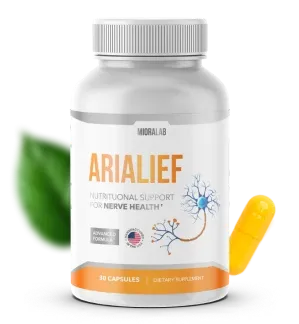

- Rapid Discomfort Relief
- Comprehensive Metabolic Support
- Natural and Safe Ingredients
- Strong Imune Support
- Promotes Long-Term Nerve Health
- Backed by Scientific Research
- Temporary discomfort relief only
- Limited metabolic support
- Contains artificial additives
- Weak imune support
- No focus on long-term support
- Lacks solid scientific backing

- Rapid Discomfort Relief
- Comprehensive Metabolic Support
- Natural and Safe Ingredients
- Strong Imune Support
- Promotes Long-Term Nerve Health
- Backed by Scientific Research

- Temporary discomfort relief only
- Limited metabolic support
- Contains artificial additives
- Weak imune support
- No focus on long-term support
- Lacks solid scientific backing
Is Arialief Right for You? Here’s Who I Found It Seems to Help Most
As I’ve spent time researching Arialief and going through countless user experiences, one thing has become abundantly clear to me: this isn’t being positioned as just another run-of-the-mill ‘pain reliever.’ From everything I can see, it’s designed as more of a holistic, full-body solution for people who are genuinely ready to address their nerve issues from the ground up. And what’s really stood out from the Arialief reviews I’ve read is that this supplement appears to be making a difference for a surprisingly wide range of individuals – across various age groups, backgrounds, and even different levels of nerve discomfort severity.
From my observations, a significant group of people who seem to find real value in Arialief are adults, particularly those over 40, who’ve been battling chronic nerve discomfort. I’m talking about symptoms like that persistent burning, tingling, or numbness, especially in the hands and feet. I’ve come across many stories from individuals managing conditions such as diabetic neuropathy, sciatica, or lingering post-surgical nerve damage – often situations where they felt traditional medications offered them very little help. For these users, it seems Arialief isn’t just about trying to dull the pain; it’s more about their journey towards restoring balance, boosting their energy levels, and supporting genuine, long-term healing.
But what I also found quite interesting during my research is that Arialief isn’t apparently just for people already experiencing intense, visible symptoms. It looks like it could also serve as an exceptional preventative formula for anyone I’d consider at higher risk – perhaps those with known poor circulation, a predominantly sedentary lifestyle, or even a family history of nerve-related disorders. I’ve seen it suggested for people starting to notice those early warning signs, like chronically cold extremities, that heavy feeling in the legs, or those unexplained little nerve zaps, as a way to potentially boost circulation and function before more significant problems can take hold.
It also seems that folks like office workers, long-distance drivers, and even some athletes are among those who have become fans of Arialief. And when I think about it, that makes a lot of sense. Nerve strain doesn’t just stem from obvious injuries or getting older; it can be a result of repetitive movements, poor posture day after day, and the ongoing daily stress that so many of us face – all of which can lead to nerve compression and inflammation. Arialief’s multi-pathway approach, which I looked into earlier, seems designed to target these kinds of triggers head-on.
Interestingly, another strong group of users I’ve noticed are those who are very consciously trying to avoid the potential long-term side effects often associated with pharmaceutical drugs. For this group, Arialief appears to represent a natural alternative that aims to support the same positive outcomes they’re looking for – like relief from pain, an enhancement in energy, and improved mobility – but without relying on harsh chemical ingredients or carrying those dependency risks. From what I can tell, for many, trying Arialief is their first empowering step away from what can feel like an endless cycle of prescriptions.
So, if you’re reading this and wondering whether Arialief might be a good fit for your specific needs, maybe ask yourself these questions: Do you often experience those unsettling electrical zaps, a dull, constant burning, or numb patches that just don’t seem to go away? Do your feet often feel cold, or do your hands tend to cramp up after typing for too long? If any of that resonates with you, then based on everything I’ve learned, Arialief could very well be what your nervous system has been missing.
Click Here To Order Arialief From The Official Website (180-Day Money-Back Guarantee)
Ready to Try Arialief? Here’s How to Get It
(And What I Recommend)
Okay, so after I’ve walked you through everything I learned about Arialief – how it appears to work, the impressive benefits people are reporting, its safety profile, and who it seems best suited for – you might naturally be wondering, ‘What’s the best and safest way to actually get my hands on it?’
I looked into this very carefully because, as I mentioned earlier, it’s really important to get the genuine Arialief supplement to ensure you’re getting the quality and the results we’ve been discussing, not to mention being covered by their full guarantee.
Where to Secure Your Authentic Arialief Supply
From all my research, the only place to purchase authentic Arialief and be eligible for the current discounts, bonuses, and that crucial 180-day money-back guarantee is through their Official Website. Buying directly from them cuts out any middlemen and ensures you’re not accidentally getting a counterfeit product from somewhere else.
My Breakdown of the Arialief Packages I Saw Offered:
When I visited their official page, I noticed they usually have a few different package options, which is great because it allows you to choose based on your needs and budget. Here’s what I typically see:
The “Try It Out” Package (2 Bottles):
- What you get: 2 Bottles of Arialief (Usually a 60-day supply).
- Price: $158 (which usually works out to about $79 per bottle – a good value!)
- My take: “I think this option is good if you’re new to Arialief and just want to test the waters and see how it starts working for you. Keep in mind, though, that for nerve health, longer-term use is often recommended to see the most significant benefits.” Try It Now
The “Most Popular” Package (3 Bottles – Usually a 90-day supply):
- What you get: 3 Bottles of Arialief.
- Price: $207 (which usually works out to about $69 per bottle – a nice saving!)
- Bonuses I often see with this: Usually includes Free Shipping and often those 2 Free Bonus eGuides I mentioned earlier, which add extra value.
- My take: “This seems to be the package most people go for, and I can see why. It gives you a solid 3-month supply, which aligns with the timeframe often suggested to experience more comprehensive results, plus you typically get a good discount per bottle and those valuable bonuses.” Get Your Offer Now
The “Best Value & Long-Term Results” Package (6 Bottles – Usually a 180-day supply):
- What you get: 6 Bottles of Arialief.
- Price: $294 (This usually brings the price down to just $49 per bottle – the biggest savings!)
- Bonuses I often see with this: Almost always includes Free Shipping and the 2 Free Bonus eGuides.
- My take: “If you’re serious about tackling your nerve health for the long haul and want the absolute best value, this is the package I’d lean towards. It gives you a full 6-month supply at the lowest possible price per bottle, ensuring you don’t run out, and you get all the perks. Plus, it lines up perfectly with their 180-day guarantee period.” 💊 Get Relief Today
Don’t Forget: Your Purchase is Protected by a 180-Day Guarantee!
This is something I really want to emphasize because it impressed me a lot: Every order I saw placed through the official Arialief website is backed by their 100% Money-Back Guarantee for a full 180 Days.
What this means for you, as I understand it, is that you have six whole months to try Arialief and see for yourself if it makes the difference you’re hoping for. If, for any reason at all, you’re not satisfied with your results, you can contact their customer support and request a full refund (minus shipping, if applicable, though some packages have free shipping). To me, this takes a huge amount of the risk out of trying it and shows real confidence from the company.
Ready to Choose Your Arialief Package?
If you feel that Arialief could be the solution you’ve been searching for, now you know how to get the genuine product and the best possible deal.

Every order of 3 or 6 packs comes with
FREE Shipping!
*97% Of Customers Order 6 Bottles (Our Recommended Option)
Order 6 Bottles Or 3 Bottles And
Get 2 FREE Bonuses
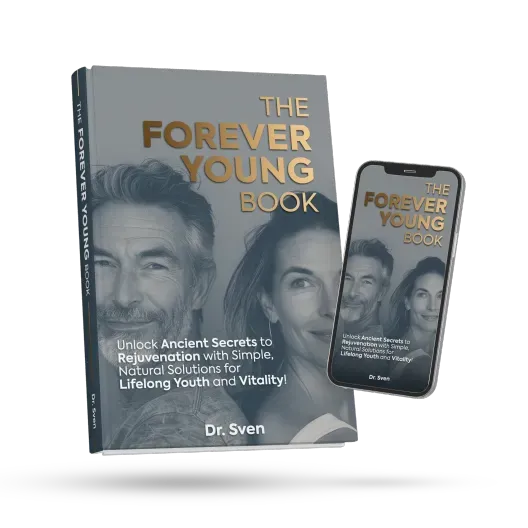

Clearing Up Your Doubts: My Arialief FAQ Breakdown
1. - Is it okay to take more than one Arialief capsule a day?
“This is a really important question I looked into. From everything I’ve seen from the official source, following the prescribed dosage of one capsule a day is crucial. It seems the formula is designed for that specific amount, so I’d definitely advise against exceeding it to ensure both safety and the intended effects.”
2. - What if Arialief doesn't work for me? Is there a money-back guarantee?
“That’s probably one of the biggest concerns anyone has when trying a new supplement, and I made sure to check this out. And yes, from what I found, Arialief comes with a pretty impressive 180-day money-back guarantee when you purchase through their Official Website. To me, this means you can essentially try it out and see how it works for you with a lot less financial risk. A company that stands by its product like that usually has a lot of confidence in it.”
3. - How long does it typically take to start feeling results with Arialief, and why are bigger packages recommended?
“This is a common question, and from my research and understanding of how natural ingredients work, patience is key. While some users I’ve read about reported feeling some changes within a few weeks, the makers of Arialief generally suggest that you need to take the supplement consistently for at least 3 to 4 months to experience the maximum potential benefits. This is because the ingredients are working to address underlying issues and support nerve health over time. That’s why I noticed they often recommend the 3 or 6-bottle value packs – not only do they usually come at a better price per bottle, but they also ensure you have enough supply for that crucial period to really let the formula work its magic.”
4. - Where is the official and safe place to buy Arialief?
“This is super important, especially after what I found out about counterfeit products (which I mentioned earlier in my review). From all my checks, the only place to get the genuine Arialief supplement, along with the guarantee and any special offers, is directly through their Official Website. Buying from there ensures you’re getting the real deal and not some imitation.”
5. - Is Arialief habit-forming or addictive?
“That’s a valid concern with any supplement you take regularly. From the information I’ve gathered from the manufacturer, Arialief is specifically formulated to be non-habit forming. It doesn’t seem to contain any ingredients that would typically lead to addiction or dependency, which I found reassuring.”
6. - Are there any common side effects I should be aware of with Arialief?
“I looked into this carefully, as safety is always a top concern for me. As I mentioned in my safety section, Arialief seems to be very well-tolerated by most users. The primary ingredients are natural and have been studied for their safety. I did see that a very small number of people might experience mild digestive unease when first starting, which can happen with many supplements as your body adjusts. However, this usually seems to pass quickly. The overwhelming feedback I found points to it being quite gentle on the system, especially compared to many pharmaceutical options. Of course, if you have specific health conditions or concerns, having a chat with your doctor is always a smart first step I’d recommend.”
7. - I saw something about bonus eBooks with certain Arialief packages. What are they?
“Yes, I noticed that too! It looks like when you opt for the 3 or 6-bottle packages of Arialief, they often include a couple of free bonus eGuides. While the specifics of these guides can sometimes vary with promotions, they are generally designed to provide additional helpful information and tips to support your overall well-being and journey to better nerve health. I see it as a nice extra bit of value they throw in.”
8. - How is Arialief different from the prescription pain medications my doctor might give me?
“That’s a question I think many people have. From my research, the biggest difference seems to be in the approach. Many prescription pain medications work by blocking pain signals or reducing inflammation in a very direct, often strong, way – which can bring relief but sometimes comes with side effects or the risk of dependency if used long-term. Arialief, on the other hand, appears to focus on nourishing and supporting the body’s own ability to heal and manage nerve health using natural ingredients. It aims to address the underlying issues like inflammation, circulation, and cellular energy, rather than just masking symptoms. The goal, as I see it, is more about long-term support and well-being, often without the harsh side effects associated with some pharmaceuticals.”
9. - How is it shipped? Do I get free shipping?
“Yes — free shipping is available on 3 or 6 bottles, and orders are typically processed within 24 hours. Most U.S. customers receive their package in 3 to 5 business days, with full tracking provided.”
Ready to see if Arialief is the answer you’ve been looking for? From my research, it presents a compelling option. You can **Click Here To Order Arialief From The Official Website and Claim Your 180-Day Money-Back Guarantee**
Wrapping Up My Arialief Investigation: Here’s My Verdict
So, after taking a really thorough look at all the different aspects of Arialief – from its ingredients and how it seems to work, to its safety profile and what actual users are saying – what’s my overall take?
From everything I’ve been able to gather during this review, Arialief genuinely strikes me as a legitimate and potentially very effective supplement for adults looking for support with their nerve health concerns. The fact that it’s formulated with ingredients that have scientific backing for their roles in nerve health, coupled with its production in FDA-registered and GMP-certified lab facilities, really solidified my confidence in its quality and potential efficacy.
Based on my deep dive into its safety measures and the nature of its ingredients, I feel quite reassured that Arialief is designed to avoid harmful chemicals that might lead to significant side effects – which, for me, and I’m sure for you, is a massive point of consideration.
Beyond the product itself, I was also genuinely impressed by what I learned about their customer-focused approach. That 180-day money-back guarantee is obviously a huge plus, offering a lot of peace of mind. But I also saw that things like the availability of both single and discounted bundle orders, often with those free bonus guides included, are not just ways to attract customers, but also seem to be genuinely appreciated and, according to some feedback I read, can even help people commit to the journey and see better results in the long run.
Therefore, my personal conclusion is that the Arialief capsule appears to have substantial merit as a beneficial nerve health supplement for adults. I’ve done my best in this Arialief review to share my findings and hopefully clear up any doubts you might have had, giving you the information you need to make a decision that feels right for you.
If you’re tired of nerve discomfort dictating your life – whether that’s from sciatica, neuropathy, or other persistent nerve-related issues – and you’re searching for a solution that, from my research, seems to be grounded in science, committed to safety, and validated by positive user experiences, then I truly believe Arialief is well worth considering. Why not give it a try and see if it can help you reclaim your comfort and get back to living your life more fully?
Special Offer on Now
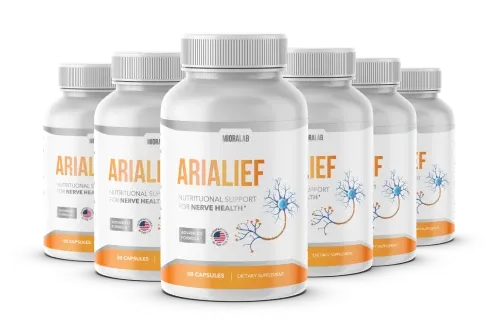
- 73% OFF your delevrey box of Arialief
- 180-DayResults of Refund Guarantee
- Shipping Value: $9.95 - Today FREE
- The Forever Young Value:$49.95 - Today FREE
- Bulletproof Health for Seniors Value: $49.95 - Today FREE
The information on this site has not been evaluated by the Food and Drug Administration.
ReviewHub is a website specializing in the evaluation of encapsulates for health, beauty and well-being.
Affiliate Disclosure
The information provided on ReviewHub is intended for general informational and educational purposes only. While we strive to ensure that all content is accurate, up to date, and valuable to our readers, it should not be interpreted as professional medical advice, diagnosis, or treatment. Always consult with a qualified healthcare provider before making any decisions regarding supplements, medications, or health strategies.
Please note that ReviewHub participates in various affiliate marketing programs, which means we may earn a commission if you click on certain product links on this website and make a purchase. These commissions come at no additional cost to you and help support the ongoing development and maintenance of this site.
We are committed to maintaining transparency and integrity. Products featured or reviewed on ReviewHub are selected based on research, relevance, and potential benefit to our audience. However, we cannot guarantee individual results, and all product claims should be verified with the official manufacturer or provider.
By using this website, you acknowledge and agree to the terms outlined in this disclosure.
If you have any questions regarding this disclaimer or our affiliate relationships, feel free to contact us.
© 2025 ReviewHub. All rights reserved.
How to Relieve Sciatic Nerve Pain Naturally: A Complete Guide
Sciatic nerve pain, also known as sciatica, affects millions of adults worldwide. Characterized by sharp, burning, or radiating pain that travels from the lower back down to one or both legs, this condition can disrupt sleep, limit mobility, and reduce quality of life.
While over-the-counter medications and physical therapy are common treatments, many people are now seeking natural alternatives to relieve sciatica pain — and with good reason. These options often come with fewer side effects and can support long-term nerve health.
🔍 What Causes Sciatic Nerve Pain?
Sciatica is usually caused by compression or inflammation of the sciatic nerve, the longest nerve in the body. Common triggers include:
Herniated or bulging discs
Spinal stenosis
Piriformis syndrome
Muscle imbalances or poor posture
Sedentary lifestyle
Identifying the root cause is essential for long-term relief.
🌿 Natural Remedies for Sciatica Pain Relief
If you’re looking for ways to relieve sciatic nerve pain without relying solely on medication, consider the following natural options:
✅ 1. Anti-Inflammatory Diet
Foods rich in omega-3 fatty acids, turmeric, ginger, and leafy greens can help reduce inflammation and support nerve health.
✅ 2. Regular Stretching & Yoga
Targeted stretches, especially for the hamstrings, hips, and lower back, can alleviate pressure on the sciatic nerve.
✅ 3. Heat & Cold Therapy
Alternating between cold compresses and heating pads can reduce inflammation and relax tight muscles.
✅ 4. Magnesium & B Vitamins
These essential nutrients play a vital role in nerve regeneration and pain regulation. Deficiencies may worsen symptoms.
✅ 5. Natural Supplements for Nerve Pain
Some plant-based supplements may help soothe sciatic pain. Look for formulas that include ingredients like:
Alpha-lipoic acid
Turmeric extract (curcumin)
Passionflower
Boswellia serrata
Acetyl-L-carnitine
These compounds are known to support nerve function, reduce inflammation, and promote a healthy response to chronic discomfort.
🧘♀️ Lifestyle Tips to Prevent Sciatica Flare-Ups
In addition to natural treatments, small lifestyle adjustments can make a big difference:
Practice good posture when sitting or standing
Avoid prolonged sitting — take walking breaks
Strengthen your core and glute muscles
Sleep on a supportive mattress
⚠️ When to See a Doctor
If your symptoms are severe, include numbness or muscle weakness, or don’t improve after several weeks, it’s important to consult a healthcare provider. Early intervention can prevent complications.
Final Thoughts
Managing sciatic nerve pain naturally is not only possible — it’s often more sustainable and less invasive than traditional treatments. Whether you’re looking to complement your current routine or start a new path, these natural approaches may offer real, long-lasting relief.
Always consult with your doctor before starting any supplement or new therapy, especially if you have underlying health conditions.
